

What is Inquiry? Why Inquiry?
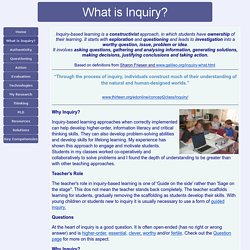
Inquiry-based learning approaches when correctly implemented can help develop higher-order, information literacy and critical thinking skills. They can also develop problem-solving abilities and develop skills for lifelong learning. My experience has shown this approach to engage and motivate students. Students in my classes worked co-operatively and collaboratively to solve problems and I found the depth of understanding to be greater than with other teaching approaches. Teacher's Role The teacher's role in inquiry-based learning is one of 'Guide on the side' rather than 'Sage on the stage". Questions At the heart of inquiry is a good question. In this video clip which can be found on the excellent edtalks site I talk about what inquiry-based learning means to me.
Intro to Inquiry Learning. A (Somewhat) New Approach to Educating and Inspiring Kids Inquiry-based learning is not a new technique—in fact, it goes back to education philosopher John Dewey—but it does stand in contrast to the more structured, curriculum-centered framework of today's schools.
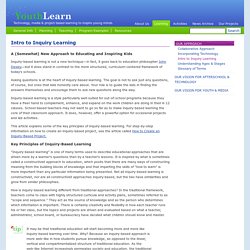
Asking questions is at the heart of inquiry-based learning. The goal is not to ask just any questions, of course, but ones that kids honestly care about. Your role is to guide the kids in finding the answers themselves and encourage them to ask new questions along the way. Inquiry-based learning is a style particularly well-suited for out-of-school programs because they have a freer hand to complement, enhance, and expand on the work children are doing in their K-12 classes. Guided Inquiry - CISSL. Kim, Sun Un & Todd, R.
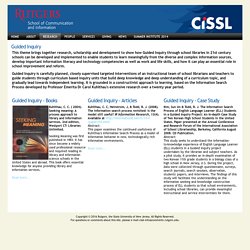
J. The Information Search Process of English Language Learner (ELL) Students in a Guided Inquiry Project: An In-depth Case Study of Two Korean High School Students in the United States. Paper presented at the Annual Conference and Research Forum of the International Association of School Librarianship, Berkeley, California August 2008. CD Publication. Abstract: This study seeks to understand the information-to-knowledge experience of English Language Learner (ELL) students in a Guided Inquiry project undertaken by the librarian and subject teachers. Inquiry Learning Definition.
Inquiry learning is an approach that provides learners opportunities to actively develop skills that enable them to locate, gather, analyse, critique and apply information in a wide range of contexts. as they develop understanding.
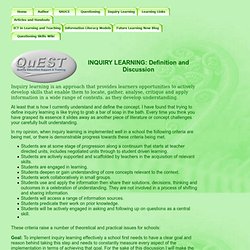
At least that is how I currently understand and define the concept. I have found that trying to define inquiry learning is like trying to grab a bar of soap in the bath. Every time you think you have grasped its essence it slides away as another piece of literature or concept challenges your carefully built understanding. In my opinion, when inquiry learning is implemented well in a school the following criteria are being met, or there is demonstrable progress towards these criteria being met. Students are at some stage of progression along a continuum that starts at teacher directed units, includes negotiated units through to student driven learning. These criteria raise a number of theoretical and practical issues for schools: Summary. What is Inquiry-based Learning? We learn best when we are at the center of our own learning.
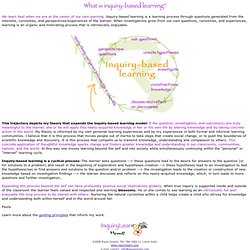
Inquiry-based learning is a learning process through questions generated from the interests, curiosities, and perspectives/experiences of the learner. When investigations grow from our own questions, curiosities, and experiences, learning is an organic and motivating process that is intrinsically enjoyable. This trajectory depicts my theory that expands the inquiry-based learning model: If the question, investigation, and outcome(s) are truly meaningful to the learner, she or he will apply this newly-acquired knowledge in her or his own life by sharing knowledge and by taking concrete action in the world. Inquiry learning & information literacy. Introduction. 1.

Students learn isolated skills and knowledge, starting with the simple building blocks of a particular topic and then building to more complex ideas. While this appeals to common sense (think of the efficiency of a automobile assembly line), the problem with this approach is the removal of any context to the learning, making deep understanding of the content less likely. Perkins calls this approach elementitis, where learning is structured exclusively around disconnected skills and fragmented pieces of information. 2. Students learn about a particular topic. The solution that Perkins offers to the typical classroom experience is what he calls learning by wholes, structuring learning around opportunities to experience or engage in the topic as it would exist outside of school.
An example of ‘learning by wholes’ can be found in my own Cigar Box Project, a year-long, grade 7 study where students explored 5 themes in Canadian history.